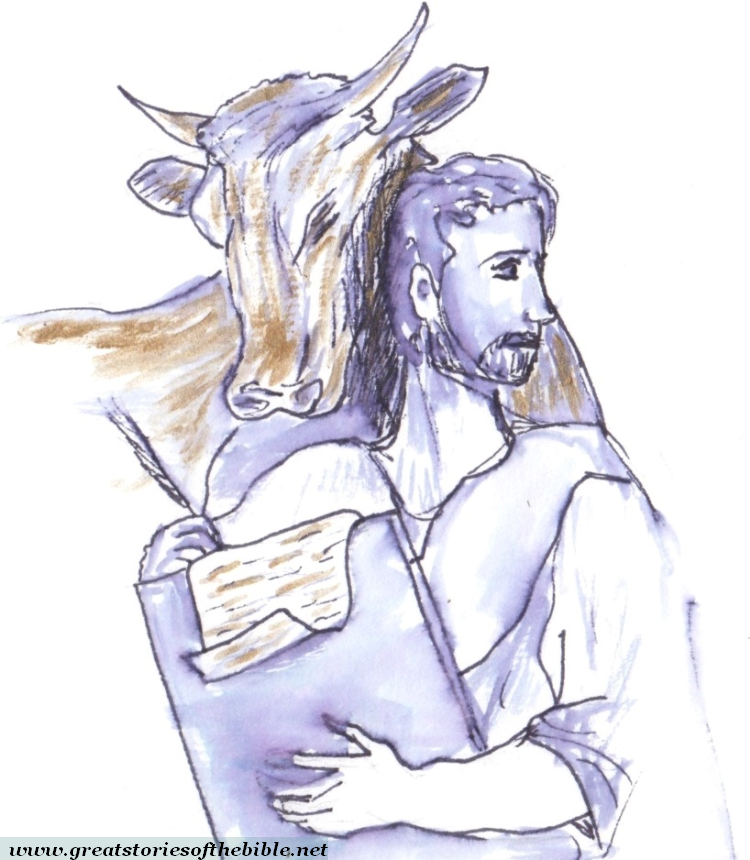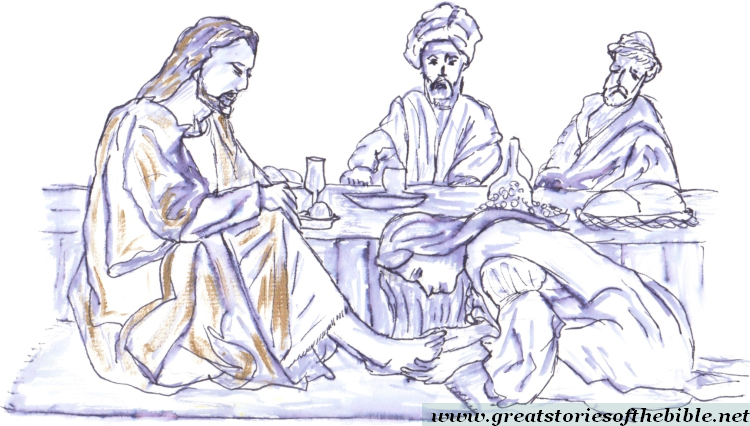Gospel of Luke
Make friends by means of unrighteous wealth
The Tradition attributes the third canonical gospel (together with the Acts of the Apostles: they are one work in two parts) to Luke, the doctor who accompanied the Apostle Paul in some of his journeys (see the “we” form in Acts 16,10-17; 20,5-21,1; 27,1-28,16). The recipient of the Book (the «most excellent Theophilus»: Luke 1,3; see Acts 1,1) belongs to a Christian community coming from the Gentiles: in it there are pronounced differences between rich and poor people. Even Luke has the gospel of Mark among his sources; with the gospel of Matthew he has in common a hypothetical “Q Source”, a collection of Jesus’ sayings. Luke is a cultured Christian, he has a great mastership in using the Greek language and he knows very well the Septuagint. He probably writes in the 70s of the I century AD.
The gospel starts with a prologue (Luke 1,1-4) in which the evangelist underlines the research he did to write the Book; it follows an introduction to Jesus’ mystery going from the narration of the miraculous conception of John the Baptist to the end of the temptations that Jesus suffered in the wilderness (Luke 1,5-4,13); then we have the first part of Jesus’ mission, mostly set in Galilee (Luke 4,14-9,50); the second part of Jesus’ mission, that Luke organizes in the “frame” of Jesus’ journey to Jerusalem (Luke 9,51-19,28); finally we have the fulfillment of the paschal mystery of the Lord’s death and resurrection that takes place in Jerusalem and its surroundings (Luke 19,29-24,53). The narration of Jesus’ birth and childhood is parallel to John the Baptist’s one and it is different from Evangelist Matthew’s one: we have Emperor Augustus’ enrollment, Mary and Joseph’s journey from Nazareth to Bethlehem, Jesus’ birth in a makeshift shelter and His being placed in a feeding trough, the visit of the shepherds of the surroundings. In the gospel of Matthew Joseph is the recipient of many angelic messages (he is a true guardian for the Holy Family: see Matt 1,18-24; 2,13-23); Luke instead underlines Mary’s role: she receives the message from Angel Gabriel, she goes to visit Elisabeth her relative proclaiming the Magnificat, she is amazed by the events that involve her «pondering them in her heart» (Luke 2,19.51). The Magnificat and the Benedictus (the praise canticle that Zechariah, John the Baptist’s father, proclaims in Luke 1,68-79) are only in the gospel of Luke; the Church uses them in the daily Liturgy of the Hours.
In the VI century a monk called Dionysius the Little uses the historical coordinates from the gospel of Luke («Now it happened in those days, that a decree went out from Caesar Augustus that all the world should be enrolled. This was the first enrollment made when Quirinius was governor of Syria»: Luke 2,1-2) to establish the beginning of the Christian era in the year 753 after the foundation of Rome. However, more recent and precise evaluations backdate Jesus’s birth by about six years: the enrollment about which Luke informs us is probably not the one that is cited by other historical sources (it was in 6 AD), but a previous and less-known one. This is the origin of the mistake, which is by now part of our calculation of the years and it cannot be corrected.
Evangelist Luke’s symbol is the winged ox because his gospel starts the narration from Zechariah the priest doing his service in the Temple of Jerusalem, where it was a common practice to sacrifice those animals.
I present to you some themes that are typical of the third gospel. The mercy and the forgiveness towards the sinners: only in the gospel of Luke Jesus explicitly considers His missions as a sort of “Jubilee year” (see Luke 4,16-21), He forgives the sinner woman who washed His feet with her tears (Luke 7,36-50), He tells the parable of the good Samaritan (Luke 10,25-37), of the lost coin (Luke 15,8-10), of the merciful father (Luke 15,11-32), He obtains the conversion of Zacchaeus the publican (Luke 19,1-10), He heals the servant of the high priest to whom one of His disciples cut the right ear (Luke 22,51), He promised Paradise to the repentant criminal crucified near Him. (Luke 23,43). 
Prayer as the background of all the Christ’s mission: Jesus receives the Holy Spirit after John’s baptism while He is praying (Luke 3,21), He prays after the preaching and the miracles (Luke 5,16), He prays before choosing the Twelve Apostles (Luke 6,12), He prays before asking to the disciples who they are thinking He is, He is transfigured while He is praying (Luke 9,29), He rejoices in the Holy Spirit after listening the report of the disciples’ mission (Luke 10,21-22), He teaches the “Our Father” after having prayed (Luke 11,1-4), He prays in the “wrestle” of the Mount of Olives (Luke 22,41-44: see the Greek “en agōnía”), He prays so that the Apostle Peter could maintain his Faith (Luke 22,31-32), He prays for His oppressors (Luke 23,34). His last words are different from the ones in the gospels of Matthew and Mark («My God, my God, why have you forsaken me?», the beginning of Psalm 22): Luke chooses «Father, into your hands I commit my spirit!» (a quote from Psalm 31,6 with the addiction of the word “Father”), more suitable for his Gentile recipients who probably would have not understood that even in the first one Jesus is expressing is final hope in God’s intervention (I invite you to read the whole Psalm 22). Jesus is considered a Savior by Luke (this title is absent in Matthew and Mark, but often attributed by the Gentiles to their gods and by the Septuagint to the Hebrew God) and Lord (a title that is only attributed to God by the Septuagint): see e.g. Luke 2,11. Finally, Luke is particularly attentive to the poor people’s situation and to the problems caused by an unfair distribution of wealth; I propose to you a parable, exclusively present in the gospel of Luke, about that theme: the dishonest manager (Luke 16,1-13).
«There was a certain rich man who had a manager. An accusation was made to him that this man was wasting his possessions. He called him, and said to him, ‘What is this that I hear about you? Give an accounting of your management, for you can no longer be manager.’ "The manager said within himself, ‘What will I do, seeing that my lord is taking away the management position from me? I do not have strength to dig. I am ashamed to beg. I know what I will do, so that when I am removed from management, they may receive me into their houses.’ Calling each one of his lord’s debtors to him, he said to the first, ‘How much do you owe to my lord?’ He said, ‘A hundred batos of oil.’ He said to him, ‘Take your bill, and sit down quickly and write fifty.’ Then said he to another, ‘How much do you owe?’ He said, ‘A hundred cors of wheat.’ He said to him, ‘Take your bill, and write eighty.’». To this point nothing is strange: a manager who badly administrated the wealth entrusted to him finds a trick to save his privileges.
His condemnation seems to be certain; we are instead surprised by the follow-up: «His lord commended the dishonest manager for his shrewdness, for the sons of this world are, in their own generation, more shrewd than the sons of light. I tell you, make for yourselves friends by means of unrighteous mammon [wealth], so that when it fails, they may receive you into the eternal tents». In Luke’s opinion wealth is unrighteous and dishonest when it becomes the sole purpose of someone’s life, destroying the brotherly relationships (see Luke 12,13-15), digging among the persons «a great gulf» of selfishness and indifference (see Luke 16,26), making dead-like who trust in it (see Luke 6,24-26: the «woe to you» intended for the rich people is a funeral lament). The manager receives praise because he understood that he has to put the brotherly relationships in advance of the wealth. The friends who receive us «into the eternal tents» may be the same needy persons we helped one day; the idea of the «tents» reminds us the sanctuary in which God accompanied the Hebrew people during the journey in the wilderness.
«He who is faithful in a very little is faithful also in much. He who is dishonest in a very little is also dishonest in much. If therefore you have not been faithful in the unrighteous mammon, who will commit to your trust the true riches? If you have not been faithful in that which is another’s, who will give you that which is your own? No servant can serve two masters, for either he will hate the one, and love the other; or else he will hold to one, and despise the other. You are not able to serve God and mammon». A wealth that death can remove in the most unexpected moment (see Luke 12,20-21) is not «true» or “ours”; the name «mammon», a personification for the “god of money”, is an Aramaic word meaning “heritage” and it sounds very similar to the Hebrew verb used to indicate the Faith in the one and only God (‘āman): trusting in the idol of wealth is a parody of the true Faith.
I have to underline that Luke does not condemn mere wealth. For example: Jesus and His disciples are supported by the wealth of some rich women (Luke 8,2-3); Zacchaeus probably remains rich even after the great donations he made, nevertheless «Today, salvation has come to this house, because he also is a son of Abraham. For the Son of Man came to seek and to save that which was lost» (Luke 19,9-10). Luke’s warning, in fact, is not to put wealth in advance of the Kingdom of God and its requirements (see Luke 12,22-31), in particular brotherly love; the evangelist wants the Christian community to become like the first Church of Jerusalem: «And the full number of those who believed were of one heart and soul. Not one of them claimed that anything of the things which he possessed was his own, but they had all things in common. [...] For neither was there among them any who lacked, for as many as were owners of lands or houses sold them, and brought the proceeds of the things that were sold, and put them at the apostles’ feet, and distribution was made to each, according as anyone had need» (Acts 4,32.34-35).
In the next post we will examine the gospel of John.